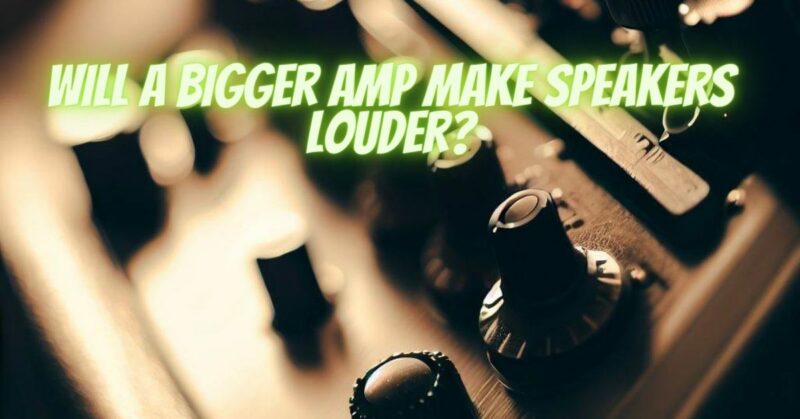When it comes to audio systems, there’s often a common misconception that a bigger amplifier automatically makes speakers louder. While amplifier power certainly plays a role in determining the volume of your speakers, it’s essential to understand how amplifier power, speaker efficiency, and speaker wattage ratings all work together to affect loudness. In this article, we’ll explore the relationship between amplifier size and speaker volume, shedding light on the key factors at play.
Amplifier Power: The Basics
Amplifiers are electronic devices that take an audio signal (like from a guitar, microphone, or preamp) and increase its voltage, thus making it louder. The power output of an amplifier is measured in watts (W). The more watts an amplifier can deliver, the more power it can provide to the connected speakers.
Speaker Efficiency: Sensitivity Matters
One of the most critical factors influencing speaker loudness is speaker efficiency, often measured in sensitivity. Sensitivity is typically expressed in decibels (dB) and represents how efficiently a speaker converts electrical power (from the amplifier) into acoustic energy (sound). The higher the sensitivity rating, the more efficiently the speaker uses the power it receives.
The Relationship Between Amplifier Power and Speaker Loudness
Here’s how amplifier power and speaker sensitivity interact to affect loudness:
- Higher Amplifier Power: A larger amplifier with more watts can deliver more electrical power to the speakers. However, the increase in power does not necessarily result in a linear increase in loudness. In fact, doubling the amplifier power typically yields only about a 3 dB increase in loudness, which is a perceptible but not dramatic change.
- Speaker Sensitivity: Speakers with higher sensitivity ratings can produce more sound with the same amount of amplifier power. For example, a speaker with a sensitivity rating of 95 dB will be louder with a 10-watt amplifier than a speaker with a sensitivity rating of 85 dB when both are driven by the same amplifier.
- Matching Amplifier to Speaker: To achieve the desired loudness, it’s crucial to match the amplifier’s power output to the speaker’s recommended power handling capacity. Using an amplifier that exceeds the speaker’s power handling can lead to distortion or damage.
- Efficiency Matters: Efficient speakers (high sensitivity) can sound much louder with a modest amplifier than inefficient ones. This is particularly important for live sound reinforcement, where loudness is critical.
Speaker Wattage Rating
Speakers also have wattage ratings that indicate the maximum power they can handle without damage. It’s essential to ensure that your amplifier’s power output does not exceed the speaker’s maximum handling capacity to prevent damage.
In summary, while a larger amplifier can contribute to increased loudness, it’s not the sole determinant. Speaker sensitivity, efficiency, and the matching of amplifier power to the speaker’s capacity all play vital roles in achieving the desired volume levels. Understanding this interplay between amplifier power and speaker characteristics is key to optimizing your audio system for the best performance and avoiding potential damage to your speakers. Ultimately, it’s the synergy between your amplifier and speakers that delivers the ideal sound and volume for your needs.


